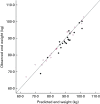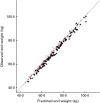Effects on obese women of the sugar sucrose added to the diet over 28 d: a quasi-randomised, single-blind, controlled trial
- PMID: 24164779
- PMCID: PMC3919641
- DOI: 10.1017/S0007114513002687
Effects on obese women of the sugar sucrose added to the diet over 28 d: a quasi-randomised, single-blind, controlled trial
Abstract
To investigate whether obese women can compensate for sucrose added to the diet when it is given blind, rather than gaining weight or exhibiting dysfunctional regulation of intake, in the present study, forty-one healthy obese (BMI 30-35 kg/m²) women (age 20-50 years), not currently dieting, were randomly assigned to consume sucrose (n 20) or aspartame (n 21) drinks over 4 weeks in a parallel single-blind design. Over the 4 weeks, one group consumed 4 × 250 ml sucrose drinks (total 1800 kJ/d) and the other group consumed 4 × 250 ml aspartame drinks. During the baseline week and experimental weeks, body weight and other biometric data were measured and steps per day, food intake using 7 d unweighed food diaries, and mood using ten- or seven-point Likert scales four times a day were recorded. At the end of the experiment, the participants weighed 1·72 (SE 0·47) kg less than the value predicted by the National Institute of Diabetes and Digestive and Kidney Diseases (NIDDK) model; the predicted body weight accounted for 94·3% of the variance in the observed body weight and experimental group accounted for a further 1·1% of the variance in the observed body weight, showing that women consuming sucrose drinks gained significantly less weight than predicted. The reported daily energy intake did not increase significantly, and sucrose supplements significantly reduced the reported voluntary sugar, starch and fat intake compared with aspartame. There were no effects on appetite or mood. Over 4 weeks, as part of everyday eating, sucrose given blind in soft drinks was partially compensated for by obese women, as in previous experiments with healthy and overweight participants.
Trial registration: ClinicalTrials.gov NCT01799096.
Figures

 , sucrose;
, sucrose;  , aspartame. (A
colour version of this figure can be found online at
, aspartame. (A
colour version of this figure can be found online at 
 , sucrose;
, sucrose;  , aspartame. (A
colour version of this figure can be found online at
, aspartame. (A
colour version of this figure can be found online at Comment in
-
Liquid calories, energy compensation and weight: what we know and what we still need to learn.Br J Nutr. 2014 Feb;111(3):384-6. doi: 10.1017/S0007114513003309. Epub 2013 Oct 29. Br J Nutr. 2014. PMID: 24164833 Free PMC article. No abstract available.
References
-
- Morenga LT, Mallard S & Mann J (2013) Dietary sugars and body weight: systematic review and meta-analyses of randomised controlled trials and cohort studies. Br Med J 346, e7492 - PubMed
-
- Houchins JA, Burgess JR, Campbell WW, et al. (2012) Beverage vs. solid fruits and vegetables: effects on energy intake and body weight. Obesity 20, 1844–1850 - PubMed
-
- Reid M, Hammersley R, Hill AJ, et al. (2007) Long-term dietary compensation for added sugar: effects of supplementary sucrose drinks over a 4-week period. Br J Nutr 97, 193–203 - PubMed
-
- Reid M, Hammersley R & Duffy M (2010) Effects of sucrose drinks on macronutrient intake, body weight, and mood state in overweight women over 4 weeks. Appetite 55, 130–136 - PubMed
Publication types
MeSH terms
Substances
Associated data
Grants and funding
LinkOut - more resources
Full Text Sources
Other Literature Sources
Medical

